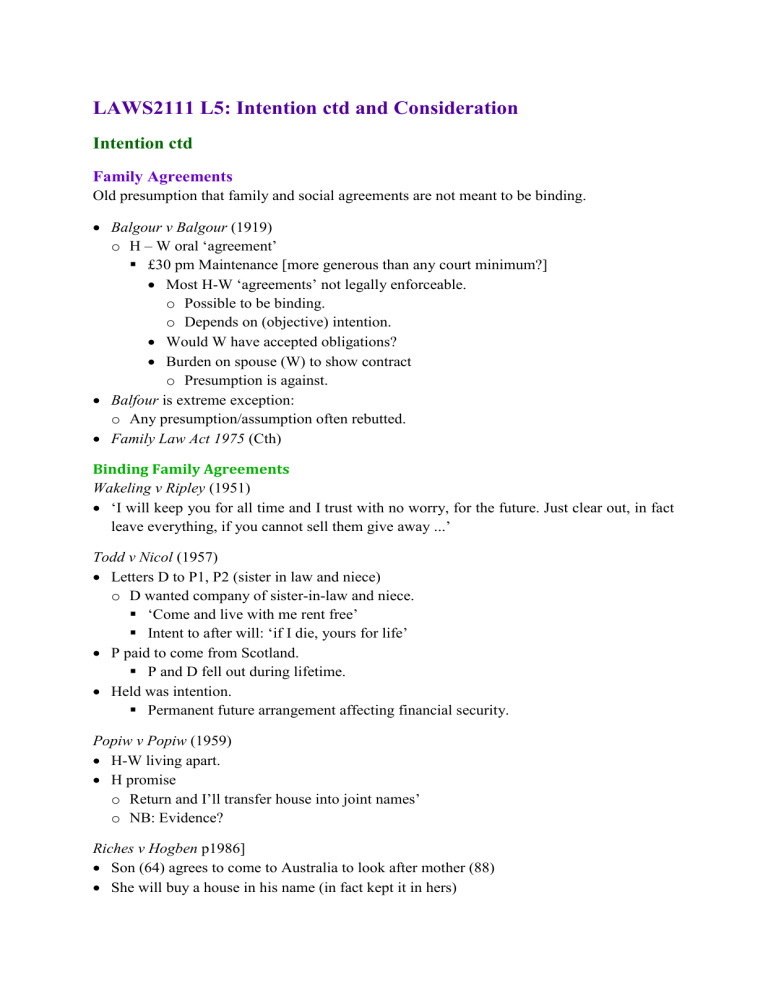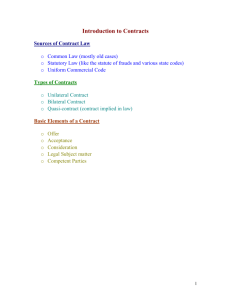LAWS2111 Week 5

LAWS2111 L5: Intention ctd and Consideration
Intention ctd
Family Agreements
Old presumption that family and social agreements are not meant to be binding.
Balgour v Balgour (1919) o H – W oral ‘agreement’
£30 pm Maintenance [more generous than any court minimum?]
Most H-W ‘agreements’ not legally enforceable. o Possible to be binding. o Depends on (objective) intention.
Would W have accepted obligations?
Burden on spouse (W) to show contract o Presumption is against.
Balfour is extreme exception: o Any presumption/assumption often rebutted.
Family Law Act 1975 (Cth)
Binding Family Agreements
Wakeling v Ripley (1951)
‘I will keep you for all time and I trust with no worry, for the future. Just clear out, in fact leave everything, if you cannot sell them give away ...’
Todd v Nicol (1957)
Letters D to P1, P2 (sister in law and niece) o D wanted company of sister-in-law and niece.
‘Come and live with me rent free’
Intent to after will: ‘if I die, yours for life’
P paid to come from Scotland.
P and D fell out during lifetime.
Held was intention.
Permanent future arrangement affecting financial security.
Popiw v Popiw (1959)
H-W living apart.
H promise o Return and I’ll transfer house into joint names’ o NB: Evidence?
Riches v Hogben p1986]
Son (64) agrees to come to Australia to look after mother (88)
She will buy a house in his name (in fact kept it in hers)
7 days after moving in, she ejects him.
Held binding: o Reasonable people would regard it so o Considerable expense by S o Certain.
Social Agreements
Clubs and Competitions
The Satanita: Clarke v. Dunraven [1897] A.C. 59 o Entry to yacht race: competition rules o Each racer contracts with each other, eg about collision damages
Lotteries and competitions
Can be binding, consider e.g. o Mutuality o Seriousness of statements o Repetition
Simpkins v. Pays [1955]
Competition entry not a mere friendly arrangement
Trevey v. Grubb (1982) 44 ALR 20
Tattslotto coupons filled in by T and G o W (G’s mother joined in) o W selected winning square o Shared costs 25% each o Enforceable agreement in those proportions
Commercial Agreements
Presumption that agreements in commercial context are intended to be binding
Like all presumptions, can be rebutted - rare o Advertisements
Carlill o Ex gratia payments
Edwards v. Skyways [1964] 1 All ER 494
Pilot made redundant
Promised "ex gratia" redundancy pay-out
"ex gratia" (= not bound to make it, ie "without liability")
Does not imply agreement of no legal effect
'Subject to Contract'
Masters v Cameron (1954)
Excluding ‘Intention’ in Commercial Context
'Honour' Clauses and 'Gentleman's Agreements‘
o Rose & Frank v. Compton [1925] AC 445
Burden of proof on person saying there is no contract
"Honourable pledge" clause in business agreement
Showed intent not to have a formal or legal agreement
Unenforceable
“Heads of Agreement”, “Memorandum of Agreement”, “Letters of Intent” , “Letters of
Comfort”, “Termsheets” o Confusing usage: beware of label - need to examine content
Helmos Enterprises Pty Ltd v Jaylor [2005] NSWCA
Certainty and intention to create legal relations
Separate but overlapping evidence
Examples: o “Heads of Agreement”
Anaconda Nickel v Tarmoola (2000)
Coal Cliff v Sijehama (1991) NSWCA
Factory 5 Pty Ltd v State of Victoria [2010] o “Letter of Intent”
Pirt Biotechnologies v Pirtferm [2001] WASCA
"The parties at this stage do not seek a contractual obligation but require for the time being a clear indication as to their respective interests…” o “Letter of Comfort”
Kleinwort Benson v MMC [1989] 1 ALL ER 785
“It is our policy to ensure that the business of [M] is at all times in a position to meet its liabilities to you under the [loan facility] agreements”
Held: no settled meaning – language was statement of present fact not future promise o “Termsheet”
Maple Leaf v Rouvray [2009] 2 Lloyd’s Rep 475, 511
This termsheet shall serve as the legally binding document until such time as agree[ment] amongst the parties is finalised”
Signature may be significant o Government schemes
Australian Woollen Mills v Commonwealth [1954]
Government wool subsidy scheme in wartime
P tried to enforce subsidy scheme as a contract
Held: o No intention to make a contract
No statutory authority
Anyway, no bargaining P and Gov o Eg request, invitation to purchase wool o No inducement to buy wool
So what was it? o Conditional gift
o Administrative arrangement only
Intention to create legal relations
Difficult categories o Burden on person alleging contract
Ermogenous v Greek Orthodox Community (2002) o Hellenic association appointed Archbishop o Archbishop sued for unpaid leave o Was there an employment contract? o Held
Religious minister may have contract to perform spiritual duties
Extensive rights of control exercised
Shahid v Australasian College of Dermatologists [2008] o Educational contracts?
S applies for training positions and appeals decisions
College appeal procedures in training handbook + fee
College regarded itself as not bound
eg complete discretion on remedies
Q did each appeal application create a contract? o Held
Each lodging of appeal was intended to create legal relations
Objective position?
Handbook detailed and comprehensive o Formalities, “parties”, grounds (“error of law”)
Commercial relationship o S major commitment of time energy and money o Fees for seminars, sitting exam, appeals o Major factor - indicated intention to be bound
Consideration
Conceptual issues
Intention to create legal relations o Certain agreements may not be intended to be binding – negative
Which informal promises should be binding? o Should one-sided promises alone be enough? o Indicia of seriousness?
Civil law systems o Roman law Causa
Legally recognisable reason for enforcing a promise
Worry about promises of gifts/donations, out of estates o French law – such promises have to be notarised – ie witnessed in front of an official and documented
Old forms of action required something other than agreement
o Covenant [deed] – “signed, sealed, delivered”
Property Law Act 1974 (Qld) ss.45-47
Powers of Attorney Act 1998 (Qld) ss.11-12 o Debt – quid pro quo o Assumpsit – consideration
Common law systems o Informal promise treated seriously if “consideration”
Judicial definitions
Currie v Misa (1875) LR 10 Ex 153, 162, Lush J o “A valuable consideration, in the sense of the law, may consist either in some right, interest, profit, or benefit accruing to the one party , or some forbearance, detriment , loss, or responsibility, given, suffered, or undertaken by the other.”
Thomas v. Thomas (1842) 2 QB 851, Patteson J o “Consideration means something which is of some value in the eye of the law, moving from the [promisee] ; it may be of some benefit to the [promisor] or some detriment to the [promisee], but at all events it must move from the promisee.”
Dunlop v Selfridge [1915] AC 847, 855, Lord Dunedin [Sir Frederick Pollock] o “An act or forbearance of one party , or the promise thereof, is the price for which the promise of the other is bought , and the promise thus given for value is enforceable.”
Carlill v Carbolic Smoke Ball Co , Bowen LJ, 271 o “Any act of the plaintiff from which the defendant derives a benefit or advantage, or any labour, detriment, or inconvenience sustained by the plaintiff…”
NB: In 99% of problems, there is no problem or issue with consideration as it is clearly evident (eg buying cars, property ... things in exchange).
The problem arises when giving gifts, where there is no reciprocity. Or if there is some sort of contractual variation, a promise to pay more or one to accept less money.
Terminology
“Good” and “bad” consideration o Is it legally recognised? o Promise “supported” by consideration o Consideration to be “sufficient” (to the content of the contract)
“adequacy” irrelevant (to the amount of consideration given …) o “Gratuitous” promise
Consideration “moving” from promisee
“Executed” consideration o Contract performed
“Executory” consideration o Contract still to be performed
Features of Consideration
Distinguish “Motive” and Consideration o Thomas v. Thomas (1842) 2 QB 851
Executors agree with W
“In consideration of [H’s] desire” they would convey premises to W for life, provided W pay “£1 yearly towards ground rent”, and “shall keep premises in good and tenantable repair”
Consideration to be in exchange for promise quid pro quo . o Australian Woollen Mills v Commonwealth (1954) 92 CLR 424 o Beaton v McDivitt (1987) 13 NSWLR 162
It is not enough that one relies on a statement – consideration is not reliance. It has to be in exchange for something. ‘Consideration is the price of the promise’.
Consideration and conditional gifts o A promises to pay B £1000 on B’s arrival in Sydney (from Melbourne)
Conditional gift o Alternative context
A needs B urgently for work and B expresses concern about costs
Infer promises in exchange for performance o In Carlill
, one of the arguments was that the advertisement was ‘a gift’ and that it held no contractual footing. Bowen said this was a load of crap.
Consideration must move from promisee o Coulls v. Bagot’s Executor and Trustee Co
(1967) 119 CLR 460
Promise by N to H and W
H provides consideration: any consideration moving from W?
Good consideration if H provides consideration jointly with W.
Consideration in Australia
Beaton v McDivitt (1987) 13 NSWLR 162 o M owned 25 acre lot of land - not using all
July 1977 invited B to
Move onto land rent free and work it organically
When subdivided will transfer deeds
26 December B agreed to “accept” “offer”
Was having difficulty with own landlord o 1978-1980
B Constructed form of residence out of rock
Attempted to work land – poor soil
7 years rent free, but spent $1000 on shrubs etc o Falling out
Council requires home demolition
M bars B from property
o Legal Question
Was B working the land in exchange for M promise to transfer lot to B? o Held 2-1 was a contract
High Court had accepted bargain doctrine of consideration in Australian Woollen
Mills
Here bargain was working the land in exchange for transfer
Past Consideration
Need link between consideration and promise o Roscorla v. Thomas [1842] 3 QB 234
Sale of Horse
Later 'warranty' [ i.e. promise] about soundness
Held: “Past” consideration – ie not linked
Easy “exception” to past consideration allegation o Lampleigh v. Brathwait (1615) 80 E.R. 255
“Mere voluntary courtesy” not enough for consideration, but
Services at promisor's request, and
Later promise to pay
Raise implication that payment would be made
Pao On v. Lau Yiu [1980] AC 614, 629 o Good consideration if
1. Act at promisor's request
2. Parties understood at start that act was to be remunerated
3. Payment legally enforceable
Look out for “in consideration of you having done X, we promise Y”
Value of Consideration
Consideration must be sufficient o ie enough to be recognised by law
Law will not enquire as to its adequacy o Exact value [eg was it worth the promise?] is irrelevant
‘Nominal’ consideration is sufficient o ‘Peppercorn’ rent (by declaring there’s something in exchange, we are indicating that this is legally binding) o Look for wording “in consideration of …..”
Some ‘commercial’ value o Chappell v Nestle [1960] AC 87
Motive and Consideration o Thomas v Thomas (1842)
Compromises and forbearances (if we had a dispute about rent because you think a peppercorn isn’t enough, we might say that we terminate the lease and I give you $500 to go away. In exchange for you not suing me, I take an amount of money.) o Bona fide compromise of doubtful claim






